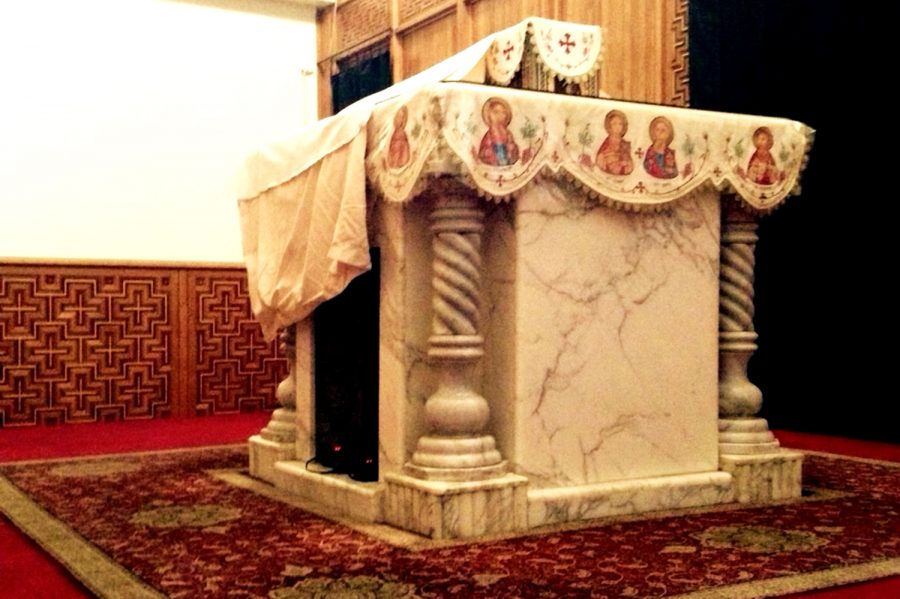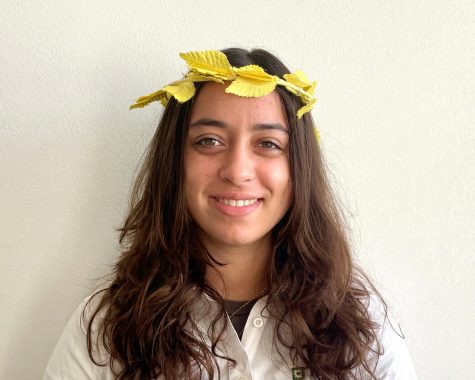Column: The process of reshaping views on religion
Photo credit: Marissa Gendy
A marble alter sits at the front of a Coptic Orthodox church which is used in the Coptic faith. Every week, communion and the oil is prepared for the congregation and liturgies are performed within this room. This is considered one of the most sacred places in the entire church and has many restrictions upon entering.
April 25, 2021
“Religion is everything”…….or at least that’s what I’ve been told all my life. It’s who you are, it who you love. Whether you consider yourself to be non-religious or a part of any organized religion, aspects of self growth and self reflection are instilled in our ways of thinking, our way of living. The way we feel about our bodies or the way we choose life partners; it all has been dictated by the “religion” we follow. Many organized religions follow a standard of prayer, the duality between right and wrong, worship and self-reflection. Children are blindly forced to follow these religions, forcing them to believe in an achievable sense of everlasting peace whereas in reality, it can build years of trauma, years of telling you no rather than yes. Parents try to perceive their children’s soul and everlasting life without the remembrance of the body and its necessities.
Many people associated with the Millennial generation and Generation Z have begun a process of disconnection with organized religions and have turned towards more radical ways of thinking. As expressed by Leigh Stein in her article, “The Empty Religions of Instagram,” “Many millennials who have turned their backs on religious tradition because it isn’t sufficiently diverse or inclusive have found alternative scripture online. Our new belief system is a blend of left-wing political orthodoxy, intersectional feminism, self-optimization, therapy, wellness, astrology and Dolly Parton.”
Younger generations denounced strictness and traditionalism which are underlying messages of many organized religions, and rather began to feed off of influencers as their spiritual leaders, promoting self-care and self-worship. They prioritize their body and its needs before those that have been outlined by a book or a teaching.
I grew up in a household where our core values revolved around the Bible, a scripture. What was considered to be right and wrong, was outlined and there was never a discussion to be had. It wasn’t until my identity got in the way of Biblical teachings that the Bible became a topic of argument rather than a source for peaceful meditation and reliance. The Bible, although praised by many, was a large influence that fueled self-hatred in my life; it taught me to repress the parts of my identity that I was struggling to even comprehend. In my experience, it taught me to believe in the secular version of our world and to let go of the things that caused a number of anxiety attacks and stress. It took a while for me to understand that organized religion wasn’t going to be a part of my identity if it meant suppressing the rest of my identity.
Once I began to reshape my understanding and desire for these organized institutions, what I longed for in life became apparent. Religion can be outdated and lack certain teachings to align with the secularity of our world and it will begin to lose traction with many generations. Although parents’ religious identities play a larger part in the making of their child’s religious identity, as they begin to grow up these children will form belief systems of their own and possibly reject the establishments of the past.
Religion isn’t a concrete or specific ideology — there is room to form, there is room to form your own thinking and understanding without the influence of scripture or traditionalism. After all, it’s your identity and who gets to say what that looks and feels like.









